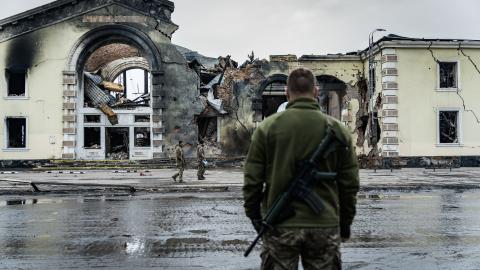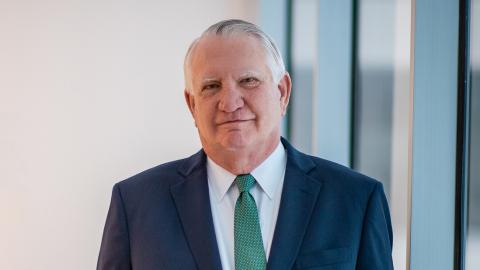This one wasn't supposed to be close.
In the weeks leading up to Venezuela's April 14 presidential election, polls consistently showed Nicolás Maduro with a double-digit lead over Henrique Capriles, the opposition figure who lost to Hugo Chávez by 11 points (55 percent to 44 percent) back in October. Maduro had served as foreign minister under the late populist demagogue; he had been named vice president and thus designated as Chávez's successor after the October election; and he had formally taken over as interim president following his mentor's death from cancer on March 5.
Maduro also enjoyed an enormous structural advantages over Capriles. After all, Chávez acolytes control the National Electoral Council, the National Assembly, the Supreme Court, the police, the military, and other public institutions. Not only did these institutions function as a massive get-out-the-vote operation for Maduro, they also allowed him to violate election rules with impunity. Meanwhile, he benefited from a laughably biased state-media apparatus and, like Chávez before him, flooded the airwaves with mandatory broadcasts (known as cadenas) that effectively served as free campaign commercials.
Noticeably lacking in charisma, the 50-year-old Maduro presented himself as the heir to the Chávez revolution, and he desperately tried to capitalize on sympathy for the late autocrat. His message wasn't exactly subtle: "I am Chávez. We are all Chávez." Indeed, Maduro called his predecessor the "Jesus Christ of Latin America" and suggested that he had played a posthumous role in selecting the first Latin American pope. In typical chavista fashion, Maduro denounced Capriles and his followers as "the heirs of Hitler," even though Capriles (a practicing Catholic) comes from a family of Jewish Holocaust survivors.
In short: An oil-rich government with near-dictatorial powers used all of its vast institutional machinery to promote Maduro, slander Capriles, and guarantee a victory for the ruling party.
And yet, as Election Day drew closer, the polls narrowed. And when the actual votes were finally tallied, Maduro had garnered less than 51 percent, while his opponent had received 49 percent. The youthful Capriles, 40, thus affirmed that he is the most popular and charismatic opposition leader of the Chávez era. As for Maduro, his most powerful political rival within the ruling party, National Assembly President Diosdado Cabello, tweeted that "the results oblige us to make a profound self-criticism."
Capriles supporters are now marching in the streets and demanding a formal recount, as well they should. There were literally thousands of reported "irregularities," which is not surprising in a country where the ruling regime is an elected autocracy. The Obama administration has called for a recount, as has the Organizationof American States. If Maduro and his fellow Chávez loyalists continue to refuse, they are virtually inviting nonstop protests, which could eventually lead to serious violence.
But even if Maduro allows a recount and emerges as the clear winner, he will face daunting economic challenges. To understand his dilemma, consider the fascinating report published last week in the Wall Street Journal.
Venezuela has more proven oil reserves than any other nation on earth but it still has to import gasoline. Why? Because of enormous government subsidies that have made gasoline "almost free." In January, Colombians paid $4.72 for a gallon of regular gasoline, and Brazilians paid $4.50. Venezuelans paid only 4 cents a gallon. Not surprisingly, on a per-capita basis, Venezuelans consume nearly five times as much gasoline as Brazilians, and close to seven times as much as Colombians. According to the International Energy Agency, Venezuela's gasoline subsidies amounted to a remarkable 8.6 percent of GDP (roughly $27 billion) in 2011. By comparison, the Chávez government spent only 5.1 percent of GDP on education and only 3.25 percent on health.
From an economic perspective, the gasoline subsidies are causing huge distortions, encouraging Venezuelans to stockpile gas and smuggle it across the Colombian border, and depriving the government of much-needed revenue. Last year, the national budget deficit hit 12 percent of GDP, and one economist, Orlando Ochoa, calculates that Venezuela's fuel-import costs reached $7.2 billion. Even Chávez, of all people, said in 2009, "One day, we have to adjust those prices. We're practically giving away gasoline."
Yet the subsidies have remained politically sacrosanct, and Chávez never seriously tried to shrink or eliminate them. He surely remembered what happened in 1989, when the Venezuelan government of President Carlos Andrés Pérez reduced gasoline subsidies and triggered violent protests, in which anywhere from 300 to 3,000 people were killed. As the Journal noted last week, the 1989 violence "deeply affected morale among army soldiers who had to shoot at fellow citizens. It helped propel Mr. Chávez, then a young army officer, to stage a failed coup against Mr. Pérez three years later. Years of instability ensued, at the end of which Mr. Chávez became president."
Today, Venezuela is already suffering from tremendous instability, especially in the aftermath of a disputed election in which government mischief was apparently rampant. When you combine the justified anger and frustration of the opposition with (1) the world's second-highest murder rate, (2) an annual inflation rate that could reach 30 percent this year, (3) chronic food, electricity, and dollar shortages, (4) endemic corruption, and (5) an autocratic government led by an inept buffoon who lacks his predecessor's demagogic charisma, you have all the ingredients for social and economic upheaval.
Thus, even if Maduro's dubious election victory is allowed to stand, the Chávez revolution is in big trouble.















